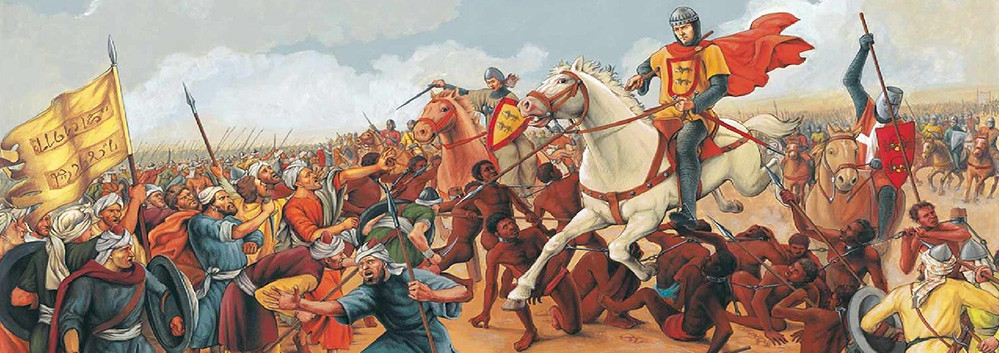A mosque wants Spain to apologize for defeating Islam in 1492: and a ham!
Leftist hispanophobia has opened the bar to demand that Spain ask for forgiveness for its past. A few days ago, the president of Mexico asked for it, and now a Muslim mosque.
A mosque in Seville wants the King of Spain to ask for forgiveness
Yesterday a statement issued by a mosque in Seville, in which the King of Spain claims to apologize for the Reconquest and for the Spanish victory in the War of the Alpujarras, was viralized on Facebook. Specifically, they ask King Felipe VI "the recognition of guilt of vileness, plunder, exile and murder, carried out by orders of the Catholic Monarchs and their most direct collaborators, which culminated in the surrender of Granada and the breach of everything subscribed to, towards the Muslim community." They also add an affirmation that shows a great historical amnesia mixed with an immense cynicism: "There has never been such a fierce persecution and eagerness to eliminate a religious community, like that carried out by the old Spanish royalty, in the time of Felipe II, extermination which culminated in the War of the Alpujarras, after the Pragmatic Sanction of 1567." Apparently, these gentlemen are unaware of the existence of genocides such as that suffered by the Jewish people at the hands of the Nazis or as that suffered by Armenian Christians at the hands of the Turks.
Islam penetrated the Iberian Peninsula with a military invasion in the year 711
The letter is not only an insult to Spain, but also an attempt to mock all the Spaniards. To begin with, there would have been no Reconquest if in 711 the Muslims had not invaded the Iberian Peninsula, which was the culmination, in turn, of the Muslim conquest of the Maghreb, begun in 647. When the Reconquest was completed in 1492, tens of thousands of Muslims remained in Spain, many of them keeping their customs, which included taking their women with their faces covered, as they are still doing today in countries like Afghanistan. A few years later, in 1499, the Moors began a series of revolts that lasted for two years. In the mid-sixteenth century Spain was threatened by two fronts: the Berbers of North Africa and the Turks who besieged Malta in 1565. A new Muslim invasion was falling, and the Turks expected to have the support of the Moriscos to take it to out, using that community in fact to destabilize Spain.
The Rebellion of the Alpujarras and the martyrdom of 3,000 Christians
Faced with this danger, King Felipe II could have simply expelled the Moors, but gave them one last chance to integrate, according to the customs of the time, with the signing of the Pragmatic Sanction of 1567, which imposed heavy restrictions on Muslims and forced them to adopt the Castilian dress. Restrictions on Muslims were certainly much milder than those imposed on Christians and Jews after the Conquest of 711, which had turned non-Muslims from Hispania into little more than slaves. The Pragmatic was the excuse that the Moors used to start a bloody rebellion in 1568, in which they brutally murdered and tortured Christians and razed churches in various locations in the former Kingdom of Granada. In some cases the samples of barbarism were purely bestial: in Ugíjar and in Bayárcal, the Moors burned the church in which many Christians had taken refuge, torturing them in various and twisted ways and finally killing them. During this bloody rebellion, some 3,000 Christians were killed because of their faith.
The Sevillian mosque praised that bloody Rebellion on its Twitter
The worst fears of the Spanish Crown were confirmed when the Moorish rebellion received Muslim military aid from North Africa, paid with Christian slaves captured by the Moors. The thing was taking such a scale that the rebellion gave way to a war, which ended up winning Spain in 1571. It is especially outrageous that the aforementioned mosque asks the King of Spain for forgiveness for those events, taking into account that on Christmas Eve last year Sevillian mosque celebrated the anniversary of that bloody rebellion, calling it a "glorious revolution" on their Twitter account, but yes, without saying a single word of the Christians who were tortured and murdered or sold as slaves by the Moors. The tweet in question stated: "Al-Andalusia free and independent. Those ancestors our Andalusians gave us back the Hope." And still claim that Spain, by mouth of the King, ask for forgiveness? What these people want is for Spain to ask for forgiveness for defeating in the battlefields a religion that has spread with military invasions since its inception.
Islam: what Christians have endured and continue to endure
It would be better that they apologize for praising an armed uprising that was plagued by acts of savagery and crimes driven by hatred of the Christian faith. And if they insist on provoking with petitions like the one cited, perhaps the rest of us will have to demand of them that they ask for forgiveness for facts like that Christians suffered more than 400 centuries of Islamic military offensives before responding with the Crusades, launched in 1096 as a campaign of defense of the Christian pilgrims against the attacks of the Seljuk Muslims. Even today, 33 Muslim countries are among the 50 that most persecute Christians. While in the West Muslims can open mosques and freely practice their religion, in countries like Saudi Arabia - which finances the construction of mosques in Europe - Christian worship is forbidden and the mere act of introducing a Bible in the country is punishable with deportation. And they are still talking about "Islamophobia" and demanding that we apologize for the Reconquest. To reject that kind of insulting pretensions, in Spain we have a popular expression that is very appropriate for this case: "¡y un jamón!" (and a ham!)
---
(Image: King Sancho of Navarre breaking the chain of slaves that surrounded the Almohad Miramamolín in the Battle of Las Navas de Tolosa, in 1212: one of the most decisive Christian victories of the Spanish Reconquest)
|
Don't miss the news and content that interest you. Receive the free daily newsletter in your email: Click here to subscribe |
- Most read
- The Pegasus case and how it could end with Pedro Sánchez due to a decision by France
- The brutal 'touch and go' of a Lufthansa Boeing 747 at Los Angeles Airport
- The real reason for Sánchez's victimizing letter using his wife as an excuse
- What did Morocco find in Pedro Sánchez's cell phone to humiliate him in this way?
- The massive takeoff of more than half of the United States B-2 Spirit stealth bombers
- Lenin: numbers, data and images of the crimes of the first communist dictator
- Honors to Corporal Palacios of the Spanish Army who died in an exercise in Poland

 ES
ES





Opina sobre esta entrada: